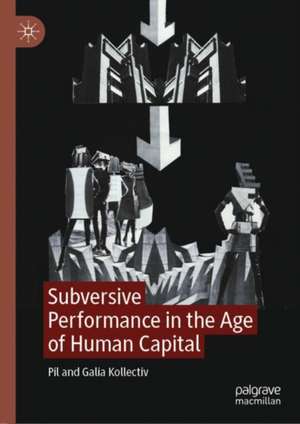Subversive Performance in the Age of Human Capital
Autor Pil Kollectiv, Galia Kollectiven Limba Engleză Hardback – 5 aug 2023
Preț: 629.09 lei
Preț vechi: 786.36 lei
-20% Nou
Puncte Express: 944
Preț estimativ în valută:
120.39€ • 124.93$ • 100.63£
120.39€ • 124.93$ • 100.63£
Carte disponibilă
Livrare economică 25 februarie-11 martie
Livrare express 08-14 februarie pentru 31.72 lei
Preluare comenzi: 021 569.72.76
Specificații
ISBN-13: 9783031358142
ISBN-10: 3031358147
Pagini: 280
Ilustrații: VIII, 280 p. 1 illus.
Dimensiuni: 148 x 210 x 23 mm
Greutate: 0.5 kg
Ediția:1st ed. 2023
Editura: Springer International Publishing
Colecția Palgrave Macmillan
Locul publicării:Cham, Switzerland
ISBN-10: 3031358147
Pagini: 280
Ilustrații: VIII, 280 p. 1 illus.
Dimensiuni: 148 x 210 x 23 mm
Greutate: 0.5 kg
Ediția:1st ed. 2023
Editura: Springer International Publishing
Colecția Palgrave Macmillan
Locul publicării:Cham, Switzerland
Cuprins
Chapter 1: Introduction.- Chapter 2: Art for All.- Chapter 3: Artists in the Social Factory.- Chapter 4: Paradoxes of Democracy.- Chapter 5: Irony and Overidentification.- Chapter 6: Conclusion.
Notă biografică
Pil and Galia Kollectiv are artists, writers and curators working in collaboration.
Textul de pe ultima copertă
“This book sharply reveals the impotence of critical art in the face of neoliberalism, highlighting art workers’ increasingly compromised role as agents of the very system of their own oppression. Importantly, the authors skilfully expand the scope for overidentification beyond its customary use of irony and performative excess, by demonstrating how such practices destabilise normative structures and exclusionary mechanisms. Through critical analyses of historical and contemporary artists’ projects, this exciting and expansively researched book draws on political theory, post-Marxist critiques of labour, subculture studies and contemporary art theory, providing us with a measured optimism in the face of the demise of art’s revolutionary potential.”
—Lina Džuverović, Curator and Lecturer in Arts Policy and Management, Birkbeck University
“Pil and Galia Kollectiv expose the fake criticality of contemporary art, showing us how in many cases today’s art declares itself as critical, whereas in reality it is only an official style (socialist realism) of neoliberalism.”
— Miran Mohar, member of IRWIN and New Collectivism
Contemporary art relies on an expansionist, modernist ideal and still progresses through a critique of earlier forms of democratisation. But beneath this democratic drive, lurks a creeping crisis. Under neoliberalism, criticality has become a zone of value production. A self-deprecating irony, exposing and re-enacting this position of impotence, is one of the few gestures left in the arsenal of critical art. Against irony, this book pits overidentification. The term has been taken to mean a kind of parodic mimicry of institutional power. The authors differentiate this from bad faith flirting with taboo aesthetics by focusing on practices grounded in a genuine identification with power that ushers the kind of excess implied by overidentification. Staging forms of critique notso readily absorbed into the structure of the present, these subversive performances herald a future beyond the democratic paradox.
Pil and Galia Kollectiv are artists, writers and curators working in collaboration. They lecture in Art at the University of Reading, Royal College of Art and University of the Arts London.
—Lina Džuverović, Curator and Lecturer in Arts Policy and Management, Birkbeck University
“Pil and Galia Kollectiv expose the fake criticality of contemporary art, showing us how in many cases today’s art declares itself as critical, whereas in reality it is only an official style (socialist realism) of neoliberalism.”
— Miran Mohar, member of IRWIN and New Collectivism
Contemporary art relies on an expansionist, modernist ideal and still progresses through a critique of earlier forms of democratisation. But beneath this democratic drive, lurks a creeping crisis. Under neoliberalism, criticality has become a zone of value production. A self-deprecating irony, exposing and re-enacting this position of impotence, is one of the few gestures left in the arsenal of critical art. Against irony, this book pits overidentification. The term has been taken to mean a kind of parodic mimicry of institutional power. The authors differentiate this from bad faith flirting with taboo aesthetics by focusing on practices grounded in a genuine identification with power that ushers the kind of excess implied by overidentification. Staging forms of critique notso readily absorbed into the structure of the present, these subversive performances herald a future beyond the democratic paradox.
Pil and Galia Kollectiv are artists, writers and curators working in collaboration. They lecture in Art at the University of Reading, Royal College of Art and University of the Arts London.
Caracteristici
Analysis of distinction between irony and the subversive performance of overidentification in contemporary art Consideration of the implications of post-Fordist labour for critical art practice A timely evaluation of the democratic aspirations of art, drawing on political theory, philosophy and art history
